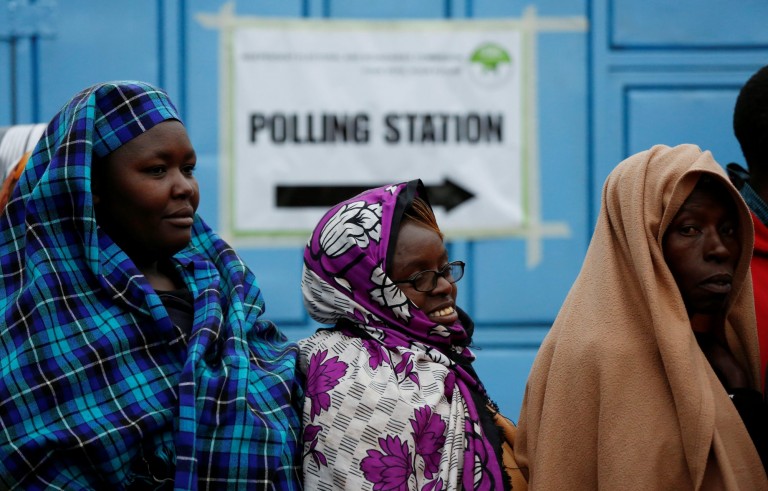JUDY WOODRUFF: A record number of Kenyans voted in their country's general elections today.
Battling it out for the presidency, the incumbent, Uhuru Kenyatta, and the veteran opposition leader, Raila Odinga. Both men are the sons of the country's first president and first vice president, respectively. And both men were leaders when post-election violence rocked the East African nation a decade ago, raising fears today that the country could see a return to fighting.
From Nairobi, special correspondent Colin Cosier reports.
COLIN COSIER: At Machakos bus station in Nairobi, people are leaving town.
MAN: We are afraid of electoral violence. The outcome of the elections are known. So us guys are just playing it safe. We don't want to risk our lives.
COLIN COSIER: They're heading back to tribal homelands. And it seems a good number of those leaving are opposition voters.
ISSAC CHISIKA: We want change. Surely, we want change. We want our country to be — to remove impunity, you see?
COLIN COSIER: This is a problem for the opposition, who fear supporters are moving away from where they're registered to vote.
OCHIENG' JUMA, NASA Voter: Even if we stop them, they will go and book another bus.
COLIN COSIER: But not everyone is leaving. Just across town, the opposition was out in force for its last big rally on Saturday.
Kenya's election has become a surprisingly close race. The opposition believes it's the strongest it's been in years. And you really get the sense here that they think there is a chance.
The man inspiring that hope is Raila Odinga, the veteran opposition leader who's competing in his fourth, and perhaps last, presidential election.
RAILA ODINGA, Opposition Leader: This is a revolution for change in our country. And the change will come on the 8th Tuesday election.
COLIN COSIER: He faces tough competition from President Uhuru Kenyatta, leader of the ruling Jubilee Party.
PRESIDENT UHURU KENYATTA, Kenya (through interpreter): Let's compete on policy grounds and not hate-mongering of our people against each other.

COLIN COSIER: Kenyan politics tends to align along tribal lines. After allegations of rampant fraud, the 2007 elections erupted into widespread ethnic violence.
Over 1,000 people died, and hundreds of thousands were displaced. Raila ran for president that year, and Uhuru, a young leader, backed the then-incumbent. In the heart of Nairobi lies Kibera, one of the largest slums in Africa. The violence that tore through here 10 years ago is fresh in the minds of some residents.
WOMAN (through interpreter): When the fighting broke out, I had a young child called Obama. The main problem I experienced was that my child ate more tear gas than food because we couldn't get food. Life was hard.
COLIN COSIER: This election, she's worried again.
WOMAN (through interpreter): The way I see it now, if things change and Raila becomes president, I don't foresee people fighting. But I see that, if they announce Uhuru, I see war.
COLIN COSIER: But not everyone fears history repeating itself.
Murithi Mutiga is a senior analyst with the International Crisis Group.
What are the chances of seeing a repeat of violence this election?
MURITHI MUTIGA, International Crisis Group: It's understandable why so many are concerned, but it's also worth pointing out a lot has changed since the last outbreak of violence in 2007. The new constitution that came into place spreads power and resources much more evenly.
COLIN COSIER: In 2013, Uhuru was facing charges in the International Criminal Court over the 2007 violence. He won that election against Raila, and the charges were later dropped. This year, Uhuru is campaigning as the development candidate, while Raila promises to reduce the cost of living.
In the park outside of the opposition rally, two young men from Uhuru's Kikuyu tribe peacefully show differing loyalties. Twenty-year-old John Mugo is voting for Uhuru.
JOHN MUGO, Jubilee Voter: My tribe doesn't impact on what I do, on what I vote. I'm a Kikuyu, but I don't vote for a tribe.
COLIN COSIER: While 25-year-old Vincent Kimani is backing Raila.
VINCENT KIMANI, NASA Voter: My vote, it's not about tribe. It's about a better nation, because I believe, when you work together, good things can happen.
COLIN COSIER: A record number of Kenyans registered to vote in this election. And with the opposition warning of vote-rigging, the question is, will either candidate be willing to concede defeat? Long lines and a cold drizzly morning didn't stop Nairobi's voters from turning out early and in large numbers.
MAN: It was good. Yes, everything was good.
MAN: It is disappointing, because we came here very early in the morning, the wee hours in the morning, and almost like five hours in the line.
WOMAN: I'm glad I voted, and I hope we're going to have a peaceful election.
COLIN COSIER: Kenya's history of alleged electoral fraud means all eyes are now on the voting system. The integrity of that system took a blow last week when a top electoral official was mysteriously murdered, allegedly tortured.
International observers are watching closely. Former Secretary of State John Kerry led one such monitoring group.
JOHN KERRY, Former U.S. Secretary of State: Given what's happened in the past and given the stakes for the future, it's a very, very important election, and clearly the citizens of Kenya are taking it very, very seriously.
COLIN COSIER: Kerry's former boss President Obama, whose father was Kenyan, released a statement calling for a peaceful and credible election, and to reject violence and incitement.
Opinion polls have the candidates in a very tight race, but the only poll that counts is this one, the vote. The challenge for Kenya now is to prove that the elections are free and fair.
For the PBS NewsHour, I'm Colin Cosier in Nairobi, Kenya.












